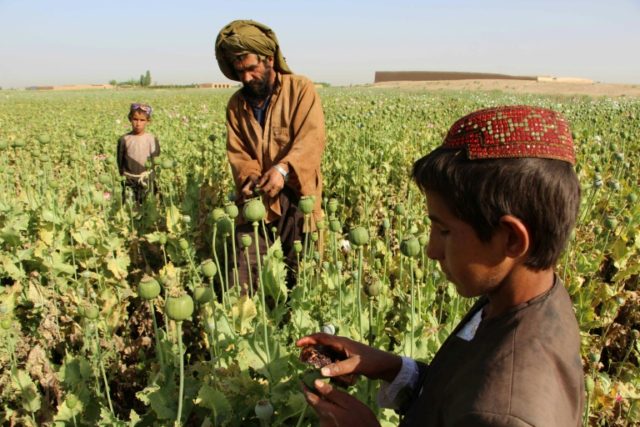Fully integrating Afghanistan into China’s Belt and Road Initiative (BRI) will require the construction of rail lines through the southern part of the South Asian country, home to the Taliban’s primary stronghold and the nation’s top opium-producing region.
Opium and its heroin derivative are the Taliban’s bread and butter — the top source of income for the terrorist organization. Taliban narco-jihadis may not be willing to surrender their lucrative economic engine, known to generate hundreds of millions of dollars annually for the terrorist.
The BRI, which turned six last week, is China’s global infrastructure and digital network project that is expected to run through Central and Southern Asia.
In 2016, Afghanistan signed a Memorandum of Understanding (MOU) to join its neighbor China’s project.
China has already begun construction of railway projects in Afghanistan that is expected to link the war-ravaged country to the China-Pakistan Economic Corridor (CPEC), a major BRI component.
Last month, the Observer Research Foundation, an Indian think-tank, acknowledged:
China is linked to northern Afghanistan through the Sino-Afghanistan Special Railway Transportation Project and the Five Nations Railway Project, and intends to connect with southern Afghanistan via the China Pakistan Economic Corridor (CPEC), in a mutually beneficial arrangement. China and Afghanistan have also initiated a fiber optic link via the Wakhan Corridor in the Badakhshan Province of Afghanistan.
In August 2018, the Organization for Policy Research and Development Studies, a Kabul-based think-tank, also noted that connecting Afghanistan to CPEC would require rail lines through the Afghan provinces of Helmand and Kandahar.
The Taliban controls most of Helmand province. While the level of Taliban control in Kandahar is lower, the area is the birthplace of the terrorist group.
Historically, the provinces of Helmand and Kandahar in southern Afghanistan have been the top opium-producing regions in Afghanistan, according to United Nations data.
Afghanistan is the world’s top producer of opium and its heroin derivative, a multi-billion dollar business that generates more money than the country’s licit exports.
U.S. officials have expressed objections to China’s BRI activities in the war-ravaged country. The United States has devoted a massive amount of blood and treasure to the conflict in Afghanistan — nearly $1 Trillion, 2,296 U.S. military deaths, and 20,543 injuries. Nevertheless, China is now the top foreign investor in the South Asian country.
The U.S. military described China’s BRI activities in Afghanistan as a potential threat in February.
China may use its global infrastructure project to “support and mask” its military objectives in Afghanistan, Gen. Joseph Votel, a top American commander in the region, declared.
Beijing understands that peace in Afghanistan is essential for the success of its Belt and Road Initiative. China has repeatedly expressed support for U.S.-backed efforts to achieve peace with the Taliban.
“Peace in Afghanistan is consistent with China’s interests as it is pivotal to the implementation of the China-initiated Belt and Road Initiative in the region,” Chinas state-run Global Times reported on Monday.
“China is keen to enroll a peaceful Afghanistan in the China-Pakistan Economic Corridor,” a senior Pakistani government official told the Nikkei Asian Review on condition of anonymity this week. “Afghanistan badly needs to build its infrastructure, and China wants to help.”
Beijing is also well aware that the Taliban controls or holds sway of nearly half of Afghanistan and has expressed support for the terrorist as a legitimate political player in the country.
Despite the Taliban’s links to Uighur Muslims in China, Beijing has been cultivating ties with the narco-jihadi group as the U.S. looks to end its war in Afghanistan.
Uighur jihadis are known to operate alongside the Taliban and its al-Qaeda allies in Afghanistan, which shares a border with China’s Xinjiang province. Xinjiang is a Uighur-majority region.
China met with Afghanistan and Pakistan on the same day that President Trump announced an end to peace negotiations with the Taliban, likely upending U.S. plans to pull out of Afghanistan.
“Pakistan hosted a third round of trilateral talks with China and Afghanistan on Saturday covering trade, counterterrorism and an end to Afghanistan’s 18-year war,” the Associated Press reported.
Afghanistan and Pakistan expressed a commitment to work with Beijing on jointly building BRI and combating terrorism in the region, China’s state-run Xinhua news outlet added.

COMMENTS
Please let us know if you're having issues with commenting.